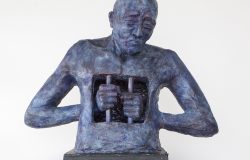Living is a creative act. Too often I encounter people who are existing – making do with what life seems to throw their way or somehow waiting for their real life to start; consequently allowing precious days to slip by adventure-less and undifferentiated from the next. There are a range of reasons for why this happens and perhaps at times in our life it is necessary for us to move back from the growing point of creativity and reflect or lie fallow so that we are re-energised for the next inspired act in our lives. I believe that one of the reason we lose sight of how living should be a creative act is because of fear. We are scared to put our necks out because we have learned (or bought into a belief system) that risk is dangerous.
Do you remember the stories of Scheherazade who told the tales of the 1001 Arabian Nights?
The story goes that every day the King of Persia would marry a new virgin and after doing so would dispatch the previous day’s wife to be beheaded. This was done in anger, having found out that his first wife was unfaithful to him. He had killed 1,000 such women by the time he was introduced to Scheherazade. Now Scheherazade was a wise and well read woman who had within her many, many tales. Against her father’s wishes, Scheherazade volunteered to spend one night with the king.
Once in the king’s chambers, Scheherazade asked if she might bid one last farewell to her beloved sister, who had secretly been prepared to ask Scheherazade to tell a story during the long night. The king lay awake and listened with awe as Scheherazade told her first story. The night passed by, and Scheherazade stopped in the middle of the story. The king asked her to finish, but Scheherazade said there was no time, as dawn was breaking. So, the king spared her life for one day to finish the story the next night.
That following night, Scheherazade finished the story and then began a second, even more exciting tale which she again stopped halfway through at dawn. Again, the king spared her life for one more day to finish the second story. And so the King kept Scheherazade alive day by day, as he eagerly anticipated the finishing of the previous night’s story. At the end of 1,001 nights, and 1,000 stories, Scheherazade told the king that she had no more tales to tell him. During these 1,001 nights, the king had fallen in love with Scheherazade, and so he spared her life, and made her his queen.
One of the tales Scheherazade tells her King is the one we now know as Aladdin. The original story of Aladdin is that he was a poor farmer and one day when ploughing his fields his plough gets caught on something. He discovers a metal ring embedded in the ground that opens him to a chamber filled with treasures. Aladdin enters this secret chamber and so beings a series of fantastic adventures.
The metaphor that lives in this story (and many other stories) is that where we stumble is where the treasure lies. Time and again you will have encountered tales that tell you about a hero or heroine who encounters troubles. Facing into their troubles regardless of their fears is when they become transformed (the Hero’s Journey). They are forced to creatively respond to life rather than react to a situation. They must create a response to how they live and find a new way of being in the world.
If you encounter people (or even yourselves) becoming stuck (i.e. your plough is caught on something,) maybe you need to pause and consider how you can respond creatively to your opportunity. I think when we encounter conflict or struggle its really life calling out to us to say, “Here is some treasure for you.”
Now you can reject the treasure, ignore or deny its existence. You can war against it and blame the gods and those around you for bringing you that treasure. Or you can respond to it in a new way. You could chose to welcome the treasure, pause and listen to what its value is for you. You may find you have discovered a cave filled with treasures that open up a realm of possibilities for you. Wouldn’t you love to see people respond creatively to life rather than the repeated cliché of fearful reaction?






